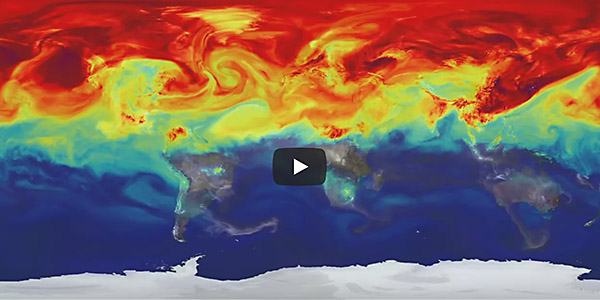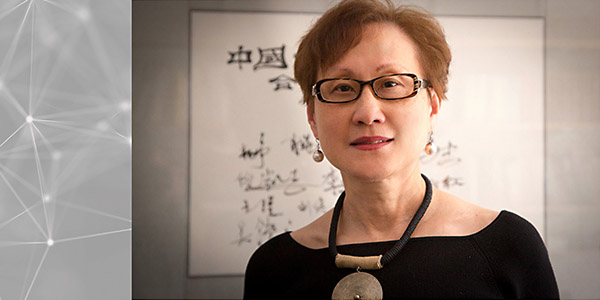Said and Done
AUGUST 2021
MIT SCHOOL OF HUMANITIES, ARTS, AND SOCIAL SCIENCES

Subscribe
Media + Awards Digest | August 2021
QUOTABLE
“At stake in our reaction to climate change...is how we should feel about our own existence as a species. The answer depends very much on whether we respond to crises like this with grace and compassion and justice, or not.”
— Kieran Setiya, MIT Professor of Philosophy, on the meaning of "existential threat"
SOLVING CLIMATE

NASA: A Year in the Life of Earth's CO2: An ultra-high-resolution NASA computer model has given scientists a look at how carbon dioxide in the atmosphere travels around the globe.
PHILOSOPHY
Why do some people call climate change an “existential threat”? | Kieran Setiya
Setiya, who co-teaches "The Ethics of Climate Change," offers a succinct, three-point response, and adds that climate change has already changed "our relationship with the planet we live and depend on, which will forever alter the way we feel about human existence."
Commentary at the MIT Climate Portal | Climate Change 2021: IPCC Report
KNIGHT SCIENCE JOURNALISM
Opinion: Stop blaming yourself for the climate crisis | John D. Sutter
Sutter, a Fellow in our KSJ program writes, "The narrative must shift from one of individual responsibility — if I turn off this lightbulb, I'm saving the planet — to one of governmental and corporate accountability. In the U.S., this means the voting public must force Congress to enact sweeping climate legislation."
Commentary at CNN
TWO RESOURCES
• Turning anxiety into creativity and resilience
It's normal to feel anxious and overwhelmed by climate change, says psychologist and climate activist Renée Lertzman. Can we turn those feelings into something productive? In this Ted Talk, Lertzman shares three key psychological insights that help develop creativity, clear thinking, and resilience for engaging with the climate crisis.
Lertzman Ted Talk | Related: MIT Podcast with Lertzman
• MIT's Council on the Uncertain Human Future
The Council on the Uncertain Human Future, established in 2014, convenes small groups for a series of conversations to reflect deeply on the climate crisis and its implications for our lives. In 2020, the SHASS Dean's Office and the MIT Environmental Solutions Initiative collaborated with CUHF leaders to launch a Council program at MIT. All members of the Institute community are welcome to participate in a conversation that increases solidarity, awareness, and momentum for what is possible.
Learn more and sign up for a forthcoming Council
MIT SHASS
Solving Climate | Humanistic Perspectives from MIT
An ongoing series addressing the economic, political, and cultural dimensions of climate change
Series
INTRODUCING BLUEPRINT LABS
“This is a unique point in time, where the power of our research and analytical approaches intersect with pressing societal needs. We are responding by expanding our research scope: developing new ways of addressing major, multifaceted challenges in education, healthcare, and the workforce.”
ECONOMICS
MIT SEII expands its scale and mission as Blueprint Labs
Over the past decade, the School Effectiveness and Inequality Initiative (SEII), a lab based in the Dept. of Economics, has grown from three visionary economists into a large network of scholars, students, and partners. The lab's research focus has also expanded to include health care and workforce issues, as well as education. To reflect this transformation, SEII has relaunched as Blueprint Labs. The mission: Using data, economics, and analytic tools to uncover the consequences of policy decisions, improve lives, and level the playing field of society.
Explore Blueprint Labs
ETHICS, COMPUTING, AND AI

Image from "Public Debate on Facial Recognition Technologies in China"
ETHICS, COMPUTING, AND AI
Case Studies in Social & Ethical Responsibilities of Computing | Summer 2021 Edition
The latest edition of peer-reviewed cases from the SERC team in the MIT Schwarzman College of Computing features five studies on subjects that include hacking, identity, and killer robots. Contributors include SHASS faculty Erik Lin-Greenberg and Tristan G. Brown. The series editors, David Kaiser and Julie Shah, also serve as the Associate Deans in the College of Computing.
Browse the Summer 2021 Edition | Related: 3Q with David Kaiser and Julie Shah
Ethics, Computing, and AI | Perspectives from MIT
Browse the Series
GOVERNANCE AND POLICY

Photo by Manny Becerra/Unsplash
POLITICAL SCIENCE
Reducing voting barriers for previously incarcerated people | Ariel White
White, who has analyzed how incarceration reduces participation in voting, especially among people of color, is now researching ways that returned citizens can re-engage with their voting rights and civic voice.
Story by MIT GOV/LAB
MIT ELECTION LAB
The Virus and the Vote
A report on the historic work of the Healthy Elections Project, led by Charles Stewart III of MIT and Nate Persily of Stanford, which brought together academics and election administration experts to assess and promote best practices to enable the 2020 election to proceed with integrity, safety, and equal access.
Browse the report | Healthy Elections Project | MIT Election Lab | Related: The Miracle & Tragedy of the 2020 Election
SECURITY STUDIES
Radical reform is in the U.S. national interest | Barry Posen
In an essay for a report from the Hague Centre for Strategic Studies, Posen writes, "This Transatlantic Alliance needs to be rather different than the past. Put bluntly, the U.S. cannot lead; it must partner.
Essay for the Hague Centre for Strategic Studies | Download PDF
POLITICAL SCIENCE | MIT GOV/LAB
How authoritarian leaders maintain support | Lily Tsai, Minh Trinh, Shiyao Liu
Study finds public anticorruption campaigns bolster leaders, even when such measures are primarily for show and lack tangible results.
Story at MIT News | Related, Minh Trinh: Searching for truth in data in authoritarian regimes
DATA, ECONOMICS, AND DEVELOPMENT POLICY
Advancing policymaking in Thailand | Pavarin Bhandtivej
“To make even the smallest contribution to improving my country would be my dream” says Bhandtivej. Through MIT’s DEDP master’s program, Bhandtivej has gained quantitative skills which he is already using to bring data to bear on policymaking in Thailand.
Story at MIT News
IN MEMORIAM

Jing Wang, S.C. Fang Professor of Chinese Languages and Culture; portrait by Jon Sachs
COMPARATIVE MEDIA STUDIES / GLOBAL LANGUAGES
Jing Wang, beloved scholar of Chinese culture, language, and media, dies, at 71
With deep sadness, we share the news that Jing Wang, our beloved S.C. Fang Professor of Chinese Languages and Culture, has died, at 71. Professor Wang, who founded the China-based media activism nonprofit NGO2.0, taught in our MIT SHASS community since 2001, mentoring hundreds of students inspired by her knowledge, wisdom, and caring spirit.
Remembrance at MIT News | Letter from President Reif | Story: Jing Wang and NGO2.0
EXPLORE
Follow us
Subscribe to Said and Done
10 issues a year
Media + Awards Digest
Current coverage
Making a Better World
Browse 12 Research Sectors
Making a Just Society
Explore the Resources
Solving Climate
Browse the Commentaries
Perspectives for the Pandemic
Explore the Series
Ethics, Computing, and AI: Perspectives from MIT
Full Series
Computing and AI: Humanistic Perspectives from MIT
Full Series
MIT Climate website
A major source of research, innovation, and discussion
Join us!
SHASS on MIT News
Research and Features
MIT Campaign for a Better World
Story | Join Us
Published by SHASS Communications
Office of the Dean, MIT School of Humanities, Arts, and Social Sciences
Editor and Designer: Emily Hiestand
Publication Associate: Alison Lanier
Published 12 August 2021





